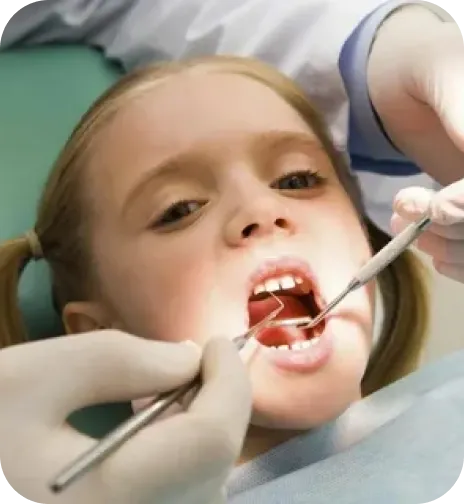Tooth Discoloration
While you may not think that your children’s discolored teeth are anything to worry about while they’re young, tooth discoloration in children may be a sign of a more serious complication, such as an infection. Instead of guessing or waiting until your kids exhibit symptoms, visit Tiny Smiles Pediatric Dentistry — in Woodbridge, New Jersey, Harlem, NY or the Lower East Side, Manhattan — for a definitive diagnosis.



Is it Normal for My Child to Have Discolored Teeth?
Tooth discoloration in children is fairly common. And many correctional options are available, depending on the source of the stains. Teeth may simply fade from bright white to off-white over time. However, if you notice a sudden drastic change in your child’s teeth, or in one tooth in particular, you need to seek a recommendation from your child’s dentist because the change in color may be a symptom of a more serious illness or unknown damage to the gum and root of the tooth.
At Tiny Smiles Pediatric Dentistry, the experienced team of dedicated children’s dentists sometimes can tell just with a visual inspection whether your child needs further dental intervention. They monitor the tooth’s development, especially if it’s accompanied by any pain or discomfort, and continue with regular preventative treatments to ensure your kids maintain a healthy smile.
What Causes Tooth Discoloration in Children?
The most common cause of tooth discoloration is inadequate and improper brushing techniques. Plaque and tartar build-up due to insufficient cleaning may lead to abnormal bacterial growth. These bacterial infections can lead to the development of cavities, bad breath, and tooth discoloration.
To identify the source of the color change, may be as easy as avoiding certain foods and liquids that are known to stain. Developing healthier brushing habits also combats the natural discoloration of teeth. However, more intense treatments are available if the tooth discoloration is due to health issues, such as:


How Is Tooth Discoloration in Children Treated?
Why Are My Child’s Adult Teeth Coming in Brown?
Dental sealants protect molars and premolars, the chewing teeth, from erosion, wear and bacterial attack. While getting the sealant may help everyone, dentists have identified certain categories of children as the best candidates. They include:
Children with deep grooves on their back teeth. Deep fissures on your children’s molars and premolars make them prone to cavities. The grooves create a perfect habitat for trapping food particles that attract bacteria, which can erode the back teeth.
Children with newly erupted back teeth. When your children’s back teeth emerge, it’s time for their first dentist visit. At that time, you may ask your dentist for advice on the suitability of dental sealants.
Children with a history of dental decay. Dental decay affects the overall health of your children. Teeth sealants help halt the progression of caries and prevent gum damage.
Children who won’t or can’t brush or floss. Some children have health conditions that make it impossible to maintain perfect dental hygiene. These special needs kids are good candidates for dental sealants.

How Can I Maintain My Child’s White Teeth?
Regular brushing and flossing are crucial to sustaining a healthy white smile. Creating good habits in teeth cleaning when your child is young is a good practice for them to carry into adulthood. Contact Tiny Smiles Pediatric Dentistry to set your child up for a healthy dental future.
Regular visits to the dentist for Regular visits to the dentist for professional cleaning and check-ups help your dentist identify problems before they get worse, providing you with prevention information that keeps your child’s smile white and happy. Professional cleaning and check-ups help your dentist identify problems before they get worse, providing you with prevention information that keeps your child’s smile white and happy.
